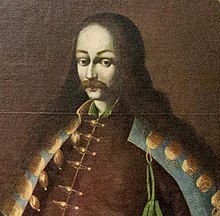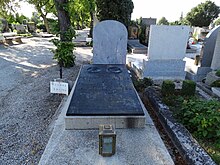Fran Krsto Frankopan
Fran Krsto Frankopan | |
|---|---|
 Portrait in 1671, at the time of his execution | |
| Born | 4 March 1643 Bosiljevo, Croatia, Habsburg monarchy (now Croatia) |
| Died | 30 April 1671 (aged 28) Wiener Neustadt, Austria, Habsburg monarchy (now Austria) |
| Resting place | Zagreb Cathedral, Croatia |
| Occupation | Poet, politician |
| Language | Croatian |
| Notable works | Elegia Gartlic za čas kratiti |
Fran Krsto Frankopan (Hungarian: Frangepán Ferenc Kristóf; 4 March 1643 – 30 April 1671) was a Croatian baroque poet, nobleman and politician. He is remembered primarily for his involvement in the failed Zrinski-Frankopan conspiracy. He was a Croatian marquess, a member of the Frankopan noble family and its last male descendant.
Biography
Early life and poetry

Born in Bosiljevo, Croatia,[1] twenty years younger than his brothers, Fran Krsto Frankopan was an authentic poet in his own right. Following the death of his father, Vuk Krsto Frankopan, he was sent to be schooled in Zagreb, where he enrolled at the Jesuit academy. He lived at today's Habdelić street in the Upper Town, before continuing his education in Italy.[2] There he published his first poetic work in Latin language, Elegia, aged 13, in 1656. He underwent various poetic influences, none of which was able to deafen his own inspiration. In such a vein was written his The Garden in which to Cheat Time (Gartlic za čas kratiti), a personal account of the poet's experiences while in prison.
Living in an area bordering on several Croatian dialects, Frankopan mainly wrote his poetry in the Kajkavian-ikavian dialect of the Croatian language (as seen in his poem Srića daje kaj misal ne zgaje). In prison, Frankopan translated Molière's Georges Dandin, the first translation to Slovenian and any Slavic language.[3]
Along with Petar Zrinski, his brother Nikola, Frankopan and his sister Katarina (Petar's wife), contributed various works of poetry and prose to 17th century Croatian literature.

Peace of Vasvár
Both Frankopan and his brother-in-law Ban (viceroy) Petar Zrinski were described as competent statesmen and prolific writers. They have seen successes in negotiating and liberating the ethnic Hungarian and Croatian areas occupied by the waning Ottoman Empire. However, the Viennese military council, wishing to curb the Hungarian influence in the Monarchy, decided to ultimately sign a peace treaty with the Ottomans, by which the liberated territories had to be ceded back to the Ottoman Empire. Hungarian and Croatian nobles saw the resulting peace treaty, the Peace of Vasvár, as utterly unfavourable and disgraceful to their interests. In response, Frankopan and Zrinski decided to raise a rebel against the king, Leopold I.
Death

Frankopan and Zrinski were seized by the Royal guard while in Vienna. As a punishment for sedition, they were sentenced to be executed in Wiener Neustadt in 1671.[1]
The deaths of Zrinski and Frankopan caused an outrage among Croatian nobles. Zrinski and Frankopan did not even try to answer the court in Vienna on the terms in which Vienna dealt with them, but rather wished to counteract its injustices with what was then a quite justifiable diplomacy. Viennese officials later recognized that the main reason for the rebellion was the dissatisfaction among Hungarians and Croats prompted by the unfavorable Peace of Vasvár, rather than unprovoked sedition.
The remains of Fran Krsto Frankopan and Petar Zrinski were handed over to the Croatian authorities and buried in the Cathedral of Zagreb in 1919, following World War I.
List of works
From the following list only Elegia was published during Frankopan's lifetime, the rest was found in manuscript following his execution at Wiener Neustadt.[4]
Lyric
- Elegia (1656), written in Latin
- Gartlic za čas kratiti, completed c. 1671
- Various pious poems
- Zganke za vrime kratiti
- Sentencije vsakojaške
Prose
- Trumbita sudnjega dneva
- Preljubljeno zlato i izabranice moga srca
Drama
- Jarne bogati (translation from Moliere)
Legacy
The portraits of Frankopan and Zrinski are depicted on the obverse of the Croatian 5 kuna banknote, issued in 1993 and 2001.[5]
His poems are still popular and are written in a combination of all three Croatian dialects: štokavian, kajkavian and čakavian. This type of writing was also regular for other writers of the Croatian Baroque Ozalj Literary Circle: Ana Katarina Zrinski and Petar IV Zrinski.[6]
Quotes
He who dies honorably lives forever.
— Fran Krsto Frankopan, Conscription
Is it possible, Almighty Creator, that such injustice oppresses your country?
— Fran Krsto Frankopan
See also
References
- ^ a b Milorad Živančević (1971). Živan Milisavac (ed.). Jugoslovenski književni leksikon [Yugoslav Literary Lexicon] (in Serbo-Croatian). Novi Sad (SAP Vojvodina, SR Serbia): Matica srpska. p. 127.
- ^ "roen-fran-krsto-frankopan". vijesti.hrt.hr.
- ^ "Archived copy" (PDF). Archived from the original (PDF) on 2020-01-12. Retrieved 2020-01-12.
{{cite web}}: CS1 maint: archived copy as title (link) - ^ Bibliography of Fran Krsto Frankopan at Matica hrvatska
- ^ Croatian National Bank. Features of Kuna Banknotes Archived May 6, 2009, at the Wayback Machine: 5 kuna Archived 2009-05-06 at the Wayback Machine (1993 issue) & 5 kuna Archived 2009-05-06 at the Wayback Machine (2001 issue). – Retrieved on 30 March 2009.
- ^ "Zrinski, Ana Katarina | Hrvatska enciklopedija".
External links
![]() Media related to Fran Krsto Frankopan at Wikimedia Commons
Media related to Fran Krsto Frankopan at Wikimedia Commons
- Poems, in Croatian
- Frankopan family
- Croatian nobility
- 17th-century Croatian poets
- Croatian male poets
- Croatian Roman Catholics
- Burials at Zagreb Cathedral
- 1643 births
- 1671 deaths
- Habsburg Croats
- 17th-century Croatian military personnel
- Baroque writers
- 17th-century Croatian nobility
- People executed by Austria
- Executed Croatian people
